 |
The News Service | |||
Profiles | ||||
|
Social science departments welcome eight new faculty for 2005-06
Eight new members of the regular faculty will begin their work in the social sciences at Brown this fall, including Nathaniel Baum-Snow, Ashley Lester, Ross Levine, Glenn Loury, and Nancy Qian in Economics; Kenneth Wong in Education; Vazira Zamindar in History; and Katrina Gamble in Political Science.  Nathaniel Baum-Snow There was a time when spatial representation of data was a matter of virtual stickpins and balky plotters. Now a new generation of geographic information systems (GIS) allows social scientists to marry massive datasets with powerful mapping software to perform analyses that would not have been feasible not so very long ago. Nathaniel Baum-Snow uses GIS to study the history and structure of cities, particularly suburbanization. “The population of center cities declined 16 percent between 1950 and 1990,” he said. “Given that the U.S. population grew by 64 percent during that time, that center-city decline is pretty phenomenal.” Baum-Snow focused on the relationship between center-city population trends and the construction of the Interstate Highway System. “I had a national dataset and I had a lot of experience in GIS,” he said, “so studying the development of the Interstates seemed like an obvious way to understand the structure of U.S. cities and the movement of the center-city population.” Highways were not the only factors at work in the development of suburbs, of course, but Baum-Snow said they may account for between a quarter and a half of the population decline in center cities nationally. “The big cost of commuting is time. One way Interstates affect cities is that they effectively increase the amount of land that is available for a given commuting time. That makes land much more attractive in the suburbs.” Instead of a 16-percent decline, Baum-Snow estimates that the nation’s center cities would have grown about 6 percent between 1950 and 1990 had Interstates not been built through urban areas. Many other mechanisms – the movement of job opportunities, for instance – are at work in suburbanization, which leaves Baum-Snow with a large research agenda. His work seems tailor-made for Brown’s Spatial Structures in the Social Sciences (S4) initiative, where he will find an intellectual home. “GIS is a big movement in many research fields, not just in economics,” he said. “It can often be ad hoc, with GIS expertise spread across various departments. Brown’s organizational structure – developing GIS at the core of the social sciences – may be unique.” Baum-Snow comes to Brown from the University of Chicago, where he did his doctoral work in economics. He earned his bachelor’s degree at Harvard (A.B. in economics, magna cum laude, 1998). “[Nathaniel’s] work is strong from an economic and theoretical perspective, but it’s also very spatial. That was evident to all of us,” said Andrew Foster, chair of the Economics Department. “One goal of the multidisciplinary initiatives is to attract more of the nation’s most talented faculty. S4 has been phenomenally successful in its hires. I worked on this search with John Logan from S4. We couldn’t be happier with the outcome.” Baum-Snow agrees. “I didn’t choose my dissertation topic because of the S4 initiative, but I was pleased to find that there is a strong and growing market for the type of research I do. I’m very glad to be here.” – Mark Nickel 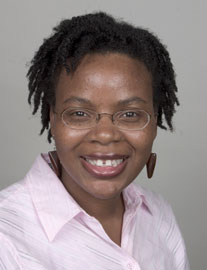 Katrina Gamble Most researchers examining the benefits and shortfalls of increasing the number of African-American representatives in Congress focus on congressional roll call votes, which provide important information about legislative outcomes but little or no information about the legislative process. Katrina Gamble has taken a different tack. In The Face of Congress: The Impact of Race on Representation and Deliberation, the dissertation that led to her Ph.D. in political science from Emory University, Gamble looked instead at the work of black representatives in committee by posing two key questions: Do black representatives participate at higher rates within committees and in informal meetings on explicitly racial issues or legislation that disproportionately affects blacks than do non-black representatives? Do black representatives enhance deliberation on such legislation by providing different arguments, viewpoints and solutions? The answer to both questions is yes: Studies of bill introductions and speeches on the floor of the U.S. House show that black representatives put more of their time and resources into developing policies and advocating for legislation of interest to many African Americans than do white representatives. But Gamble’s research turned up a surprising finding: Behind the scenes and in committees, black representatives participate rigorously on legislation of all stripes, not just on legislation benefiting African-American constituents. Gamble is the recipient of several awards and honors, including the Ted Robinson Award for Best Dissertation Proposal in Minority Politics, awarded by the Southwestern Political Science Association in 2004. She was a pre-doctoral fellow at the Center for African American Politics at the University of Rochester, and has been a visiting scholar with a number of organizations, including the Center for American Politics and Citizenship at the University of Maryland–College Park. Gamble, who received her doctorate last spring, had several offers of employment but accepted Brown’s because, she said, “the faculty in the Political Science Department seem to be very productive in their research” – an environment that Gamble welcomes as she continues her research on the politics of representation. Brown’s momentum also impressed Gamble. “People are very excited to be here,” she said. “It’s a good time to be at a place where there’s movement forward.” Gamble will teach two courses this fall: “The Politics of Race and Gender” and a First Year Seminar titled “Race and Political Representation.” – Tracie Sweeney 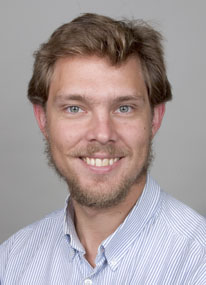 Ashley Lester Ashley Lester is a macroeconomist with a strong interest in issues of growth. It’s an interest he has had for a long time. “My interest in growth developed early. It came from spending a year or so living in India when I was a teen-ager,” Lester said. “It’s inescapable – you really see what poverty means, what it means for India to have a tiny fraction of the typical U.S. or Australian income. That year really brought it home for me.” Lester is particularly interested in understanding how growth affects inequality within a society. Inequality often increases as parts of a society gradually adopt new technologies, a phenomenon known as a dual economy. “In a developing country, a lot of people are stuck in a completely traditional sector while some people can join the modern sector. You see that all the time,” Lester said. “Shanghai is a completely modern city with skyscrapers and people working in the financial and high-tech industries. But right next to them are people working on a construction site without safety equipment, using bamboo scaffolding. That seems like a more plausible description of reality than one in which everyone is moving forward together.” Lester’s model shows how many workers, particularly those in the traditional industries, can be worse off while new technologies are being adopted. The model, Lester said, can be extended to study growth and technology adoption in developed countries, which might help explain how wages for many workers in the United States have fallen since the 1970s. Writing and testing economic theory is an intriguing exercise with its own rewards. “It’s an enormous intellectual challenge to figure out the rules of the game and to create a model that accounts for the various important forces and the dynamics,“ Lester said. ”It’s nice when you write down a theory with lots of explicit restrictions to keep it very simple and at the end of the day you get something that makes sense and tells you something unexpected.” Lester is an Australian citizen. As they completed work on their doctorates at the Massachusetts Institute of Technology earlier this year, he and his fiancée, Nancy Qian, briefly looked for positions Down Under. “We were looking there, yes, but when we visited Brown, it was clear to us that this was where we belonged,” he said. “Brown has fantastic people in our areas, and everyone seemed excited and enthusiastic.” Lester will begin teaching intermediate macroeconomics in the second semester and hopes to add a graduate-level course, probably in political economy. “Ashley will be joining a very strong group with senior faculty,” said Andrew Foster, chair of economics. “But he will stretch us because of his strong theoretical bent and his interest in broader macro issues of inequality.” – Mark Nickel  Ross Levine For Ross Levine, the study of finance is inherently multidisciplinary, linked to the law through contracts and to political science through a country’s selection and enforcement of policies and regulations. “The political system and law shape the rules of the game in which banks and markets operate,” he said. “In turn, the operation of the financial system helps determine whether money gets funneled to political cronies or to people with good ideas that will help produce a flourishing economy.” Frequently, Levine takes a global approach to his work. Struck by the fact that diet books are best-sellers in the United States while other countries lack enough food to feed their citizens, Levine’s research often flows from two questions: Why are some countries rich and others poor? Who gets to use society’s resources? “The financial sector plays a huge role” in resource allocation, he said, and can determine whether an aspiring entrepreneur in, say, Niger, has any hope of obtaining capital to get a promising idea off the ground. Levine comes to Brown from the Carlson School of Management at the University of Minnesota, where he has taught since 1999. He also taught at the University of Virginia (1997-99), was principal economist at The World Bank (1990-1997) and served at the Board of Governors of the Federal Reserve System (1987-90). He hopes his global, multidisciplinary perspective as an economist will benefit researchers at the Watson Institute for International Studies, where he is a Paul Dupee Faculty Fellow. “I came to Brown for its intellectual firepower and diversity,” Levine said. “To understand economic development more comprehensively, I need to interact with a diverse set of scholars. Besides the joy of learning through these interactions, I hope they improve the quality and impact of my research. “I also felt that I would enjoy teaching the bright, curious students at Brown,” he continued. “I look forward to having a positive impact on their lives and learning from them in the coming years.” Levine’s second book, Rethinking Bank Regulation: Till Angels Govern, (Cambridge University Press) written with James Barth and Gerard Caprio, is due out in November. His first book, written with Asli Demirguc-Kunt, is Financial Structure and Economic Growth: A Cross-Country Comparison of Banks, Markets, and Development (MIT Press, 2001). – Tracie Sweeney  Glenn Loury Glenn Loury gets labeled a lot. Brilliant theorist. Public intellectual. Prominent social critic. And, for a good chunk of his career, the contentious title of black conservative. So which fits Loury, who joins the Department of Economics this fall? “First and foremost,” he says, “I’m a scientist. I’m trying to understand the thing. I am also an intellectual and a citizen. These all get tied up together, especially when the subject is identity and power.” Loury’s academic achievements are considerable. He helped pioneer the theory of “social capital” – the idea that personal relationships can boost income and quality of life as much as factors such as education or health care. Loury’s 1976 dissertation on the topic, earned at the Massachusetts Institute of Technology, is still routinely cited in economics textbooks and journal articles. Loury has also written on welfare economics, income distribution and game theory. A former Guggenheim Fellow, he is a member of the Econometric Society, the American Academy of Arts and Sciences and the Council on Foreign Relations. Loury, however, is best known for his ruminations on race. While on the faculty at Harvard, from 1982 to 1991, and then at Boston University, where he has taught economics for the last 14 years, Loury wrote extensively on affirmative action and welfare reform, slavery and stigma. For years, Loury laid blame for problems plaguing blacks – such as poverty and addiction – squarely on the black community itself. Loury argued against affirmative action. His ties to the Reagan administration and organizations such as The American Enterprise Institute – and having his opinions regularly aired in outlets such as the New York Times and The National Review – sealed his conservative reputation. But in the mid-1990s, Loury began to break ranks. He came out against books like “The Bell Curve” and policies such as Proposition 209, which sought to eliminate race-based preferences in government hiring and college admissions. In 1996, he wrote an essay entitled “What’s Wrong with the Right.” Today, Loury describes his politics as “centrist Democrat.” “I remember sitting in a 1994 meeting on welfare reform with people like Bill Bennett and Bill Kristol and there was talk about cutting food stamps,” he recalls. “And I just said, ‘Not food stamps.’ It didn’t endear me to the group. But it was an involuntary reaction. And I began to think, ‘Who are these guys? And what am I doing with them?’ I just didn’t share their values.” This willingness to change his thinking, to shake things up, is illustrative of his decision to leave Boston University, where he founded the Institute on Race and Social Division. “I could’ve stayed, sat back, written and retired,” he said. “But at 57, I still have some business to do. And I am coming to an institution where I can get my business done.” At Brown, Loury will mine themes such as the political economy of punishment and the ethics of identity. He also hopes to create a multidisciplinary research center examining issues at the intersection of race and economics. And with the University’s Steering Committee on Slavery and Justice in full swing, Loury is sure to wade into the debate. “I like the idea that at Brown, people are talking about these issues,” he says. “And the students? My goodness. They are smart as heck. Something tells me it’s going to be jumping in the classroom.” – Wendy Y. Lawton 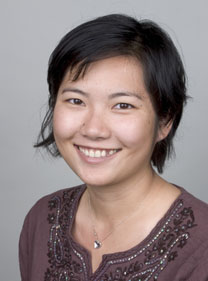 Nancy Qian Actually, many important things do depend upon the price of tea in China. Nancy Qian is a development economist who has studied how factors in China’s development – education, family size, sex selection of children, infrastructure, geography – relate to economic forces. In one study, she wanted to examine the relationship between parental income and the sex ratios of children under China’s family size policies. But how could she analyze income increases separately for husbands and wives? Qian used changes in prices for sex-specific agricultural goods as a marker for increases in the incomes of husbands and wives. In rural China, the tea crop is brought in predominantly by females, while males predominate in picking orchard fruits. She found that increases in overall income had no effect on sex ratios. However, when only female incomes rose there was an increase in survival rates for girls. Further, when the mother’s income increased, educational achievement increased for all children. (Increasing the father’s income decreased educational attainment for girls but had no effect on boys.) “One possible explanation is that when a mother’s earnings increase, her power within the household increases. It is important to note that there is boy-biased sex selection in China. This means that relative female survival rates will go up if mothers are less willing to neglect an infant of either sex because she has had more contact with the child during the prenatal and neonatal phases,” Qian said. “An increase in a mother’s power can also explain the increase in children’s education. Women live eight years longer than men on average, so they may care more about long-term investments such as education.” China, Qian said, is undergoing so many changes in so many areas, that it makes an excellent laboratory for studying development. But the language makes it far more daunting than India, the other rapidly developing giant. “Also, we know so little about China and we know so much about India, where all their records are in English,” Qian said. “The world has had a longer period of sustained contact with India. China was closed off for so long and seems culturally foreign, and that has added to the problem of language. I hope that will change.” Qian comes to Brown from MIT, where she earned her Ph.D. this year. Brown was exactly what she was looking for. “In my particular area – empirical micro development economics – Brown has a superior faculty, faculty who are senior members of the department,” she said. “Coming out of grad school, you know your own papers and your coursework, but the only area you really know in depth is your thesis area. Having senior faculty who are willing to talk about their work and ask about mine is an invaluable way to learn. And Brown has that.” “Nancy does fit into one of the strongest areas of the department,” said Andrew Foster, chair of economics, “but she also brings us some things we don’t have, including expertise in China. She will also fit right in with the Population Studies Center at a very important time in the center’s history.” – Mark Nickel 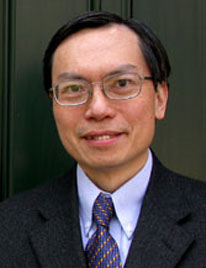 Kenneth Wong Historically, complex urban public school systems have been insulated from the political system. Now, however, with the introduction of the No Child Left Behind Act and with stakes so high, protecting schools from political systems may not be the smart choice, according to Kenneth Wong, one of the nation’s foremost researchers on urban education reform. In many urban areas, public school systems can benefit from the organizational, financial and managerial skills that a political system – a mayor’s office, for instance – offers, Wong says. This notion of integrated governance as a strategy to improve educational accountability has gained national and international attention. Wong has joined Brown’s Education Department as the first Walter and Leonore Annenberg Professor for Education Policy and Professor of Education. Holding joint appointments with the Education Department and the Annenberg Institute for School Reform (AISR), Wong will lead Brown’s new master’s program in urban education policy. A political scientist by training, Wong has conducted extensive research on urban school reform, state finance and educational policies, intergovernmental relations, and federal educational policies such as Title I in high-poverty schools. He has advised the U.S. Congress, state legislatures and the leadership of several large urban school systems on how to redesign and implement a stronger framework of accountability. His notion of integrated governance as a strategy to improve educational accountability has gained national and international attention. In late August, Wong testified before the California Senate regarding legislation on urban school system reform. The proposed legislation, Wong said, would enable mayors to lead the public school systems of California’s large urban districts. His testimony included data from comparative research he has conducted on more than 100 urban school districts around the country. Does who govern schools matter? Does it affect student performance, hiring of teachers, or diversity? Are there innovative solutions for managing the tension between resource-rich communities and resource-poor communities? Wong’s latest research explores such questions, which also are at the heart of the new master’s program Wong will lead. The program, designed to prepare students for professional careers involving policy development and analysis in urban public education, is a collaboration of the Education Department, AISR, the Taubman Center for Public Policy and the Education Alliance. The program is just one example of Brown’s efforts to develop interdisciplinary collaboration, Wong said. He is particularly excited about coming to Brown because pairing education research with other social sciences “reflects the way I was trained at the University of Chicago, among a multidisciplinary community of social science scholars.” Political science is just one among many social sciences, he said, and at the University of Chicago, where he earned his bachelor’s, master’s, and doctoral degrees, “we were encouraged to take classes in economics, sociology. ... We need to understand the whole system, not just a slice.” Wong is leaving Vanderbilt University, where he was a professor at Peabody College; director of the National Research Center on School Choice, Competition, and Student Achievement; associate director of the Peabody Center for Education Policy; and professor in the Department of Political Science, to lead the new program. Although the program does not start until academic year 2006, Wong is scheduling a lecture series for this academic year that will feature policy-makers, practitioners and researchers “just to get the conversation going.” – Tracie Sweeney 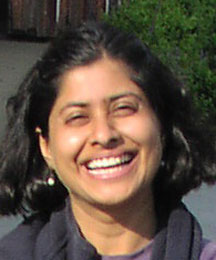 Vazira Zamindar While working in Pakistan in the early 1990s, Vazira Zamindar attended a lecture by Romila Thapar, considered by many to be India’s most distinguished historian. “I remember just being completely taken by her,” Zamindar said. “Thapar was a renowned historian of ancient India, but more importantly was so politically engaged through her historical scholarship, and was a beautiful and powerful speaker. Thus I initially went to graduate school to study ancient Indian history.” Zamindar’s graduate work first took her to the University of Michigan–Ann Arbor, where she received her M.A. in history in 1997, and then to Columbia University, where she received her doctorate in anthropology in 2003. Her research explored histories on the margins and marginalized histories, “for they allow one to critically examine relationships of power in the ordering of society,” Zamindar said. “In the case of South Asia, I am also deeply invested in border-crossing as a research method, one which challenges the nation-state as the decisive frame for the study of history.” Zamindar’s doctoral project focused on north Indian Muslim families that were divided between Delhi, India, and Karachi, Pakistan, after the Partition of 1947. Zamindar tracked the making of the Indo-Pak border in the midst of the partition’s violence and displacements. Her dissertation, Divided Families and the Making of Nationhood in India and Pakistan 1947-65, was considered for the Sardar Patel Award for best dissertation on modern India in 2002-03. Although Zamindar continues to be interested in questions of familial memories, violence and nationhood, she also is engaged in a new research project on a substantially different theme. “It centers on a World Heritage Gandharan Buddhist site in northern Pakistan and traces the transformation of a local ruin into an archaeological site embodying colonial science and history of India, and then into world heritage in a post-colonial national order,” she said. She is particularly interested in exploring relationships between archaeological authority and imagination, civilization, nationalism and notions of “Islamic intolerance,” and has been propelled by the Taliban destruction of the Bamiyan Buddhas in 2001. Zamindar, who is in The Netherlands completing a postdoctoral fellowship at the International Institute for the Study of Islam in the Modern World, arrives on campus in the spring. “Brown has a reputation of being a university with a difference, drawing upon students who are open to being challenged as well as challenging any received wisdom about the world we live in,” she said. “This is just the kind of university I would have loved to have gone to as an undergraduate and in any case consider myself fortunate to be able to teach here instead.” – Tracie Sweeney ###### News Service Home | Top of File | e-Subscribe | Brown Home Page | ||||